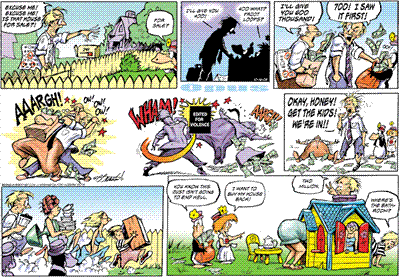The battle over proposed changes in the real estate excise tax is heating up, and depending on which side you listen to, the change would either drive prices up, or drive prices down.
The Washington Association of Realtors has launched a $1 million campaign aimed at squashing a proposed tax increase on real-estate sales.
"We are committed to doing whatever it takes to prevent any increase," said Steve Francks, the association's executive vice president. "I've never seen our members this mobilized."
The group has started running TV, radio and newspaper ads warning that the tax increase would cost homeowners thousands of dollars in "hard-earned equity" when they go to sell.
But in their fight, the Realtors face an unlikely foe: the typically anti-tax Building Industry Association of Washington (BIAW).
The homebuilders group, which — like the Realtors association — wields a lot of clout in Olympia, supports the increase because it would be used to replace so-called "impact fees" that local governments assess on new construction.
...
Homebuilders have long viewed impact fees as onerous and unfair.
Tom McCabe, the BIAW's executive vice president, said impact fees require new homeowners to pay for roads, parks and schools that everyone uses.
It makes more sense, he said, to spread that burden more widely by taxing all real-estate sales.
The trouble with listening to
either of these groups is that while they are masquerading as "consumer interest" groups, they both clearly have only their own interests in mind. The realtors claim that replacing impact fees with excise taxes would drive up house prices, but if this were true, wouldn't that be
good for them, since they would make higher commissions? On the radio yesterday I heard a BIAW spokesman claiming that the change would cause house prices to
decrease, since expensive impact fees on new construction would go away. But if the builders aren't going to pocket at least
some of that difference, why would they care?
Realtors want to "protect" sellers, builders want to "protect" buyers—they both claim to be interested in protecting people, but (pardon my cynicism) what they're really interested in is protecting themselves.
(
Ralph Thomas, Seattle Times, 11.28.2005)
 Way back in early September I made
Way back in early September I made 

